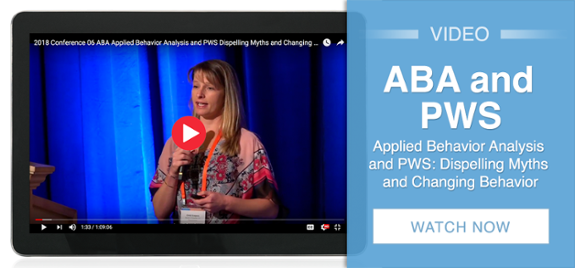In this 60‑minute video, Patrice Carroll, director of PWS services at Latham Centers in Massachusetts, describes what typical PWS behavior is, ways it can be improved, and how to remove barriers to allow children and adults with PWS to thrive and achieve their definition of a quality life. The session includes Q&A from participants in the 2020 FPWR Virtual Conference.Click below to watch the video. If you're short on time, scroll down for timestamps to find the portions you're most interested in.
Presentation Summary With Timestamps
0:29 Introduction by Sarah Peden
Patrice Caroll presents
- How behavior of children with PWS can suddenly change from kind and loving to difficult.
- Importance of parents and caregivers understanding that these behaviors aren’t predictable, and that the skill sets to be able to self‑regulate don’t come naturally to children and adults with PWS.
3:03 Live poll, review of results
- Some parents agreed that disruptive behaviors were mainly impulse control and oppositional defiance.
- The majority of polled parents (67%) answered that they were concerned about some of the behaviors their children displayed.
- Patrice describes the Commandments of PWS:
- Do what works.
- Your child doesn’t need to change, the environment does.
- Think of misbehaving as miscommunicating.
- Children have every right to be educated in the best way that allows them to thrive.
- Every family member’s needs are equally as important.
- Put your oxygen mask on first.
9:30 The barriers: Theory of Mind
- The barriers that are placed on children and adults with PWS can be many, from schedules to behavior expectations.
- In Theory of Mind terms, the ability to understand that others may have different thoughts, opinions, or experiences than you is an ability that develops over time and allows for empathy and understanding of others.
- When in school, they might struggle reading other people’s facial expressions.
- A useful tool could be to ask what others’ emotions are and turn it into a guessing game, or predicting what others’ preferences might be.
14:00 Intrusive/Inappropriate Thoughts
- Intrusive and/or inappropriate thoughts are typical for every person but rarely acted upon.
- This becomes a problem when a lack of impulse control will disinhibit them from avoiding that inappropriate behavior that comes with that thought, causing harm, discomfort or pain.
- The more children with PWS are given the opportunity to talk about their feelings and their emotions, the less likely they will be to act upon them. It can be key to show them by modeling, and this will help them understand and learn by example.
- Model how to pause, and you can even carry a pause button with you.
17:00 Sensory Processing Disorder
- Look at the environment, and try to understand what is affecting them from a tactile, visual, auditory, taste, or smell sense.
- Changes we might not notice, or be affected by, can affect them more than we think.
- Anything that has to do with feeling grounded, balance, or picking things up from the floor will be challenging, due to their lack of vestibular sense (balance).
- The proprioceptive sense is different on people with PWS.
21:44 Executive Functioning Disorder
- Whenever we need to focus, manage our emotions, follow instructions, use our memory, flexible thinking, or planning, we are using our executive functioning.
- Children and adults with PWS have a very hard time differentiating between a glitch and an emergency, and they have big reactions to most situations.
- It is important to meet them at their level, and understand how they are experiencing that feeling.
- Depending on the stress level they’re experiencing, they might not be able to follow through with complex instructions or more than three steps at a time.
26:55 Behaviors in the community
- When out in public, parents and caregivers of people with PWS can avoid interference from others and/or being judged by using a tool made specifically for it.
- This tool is a card that can help explain to other people, without speaking to them, that they have the situation under control and that unless they explicitly say so, they don’t need any help.
- There are specific strategies and coping skills that can be useful with children and adults with PWS, according to the behavior being displayed: from skin picking and food seeking to aggression and emotional outbursts.
30:00 Q&A








